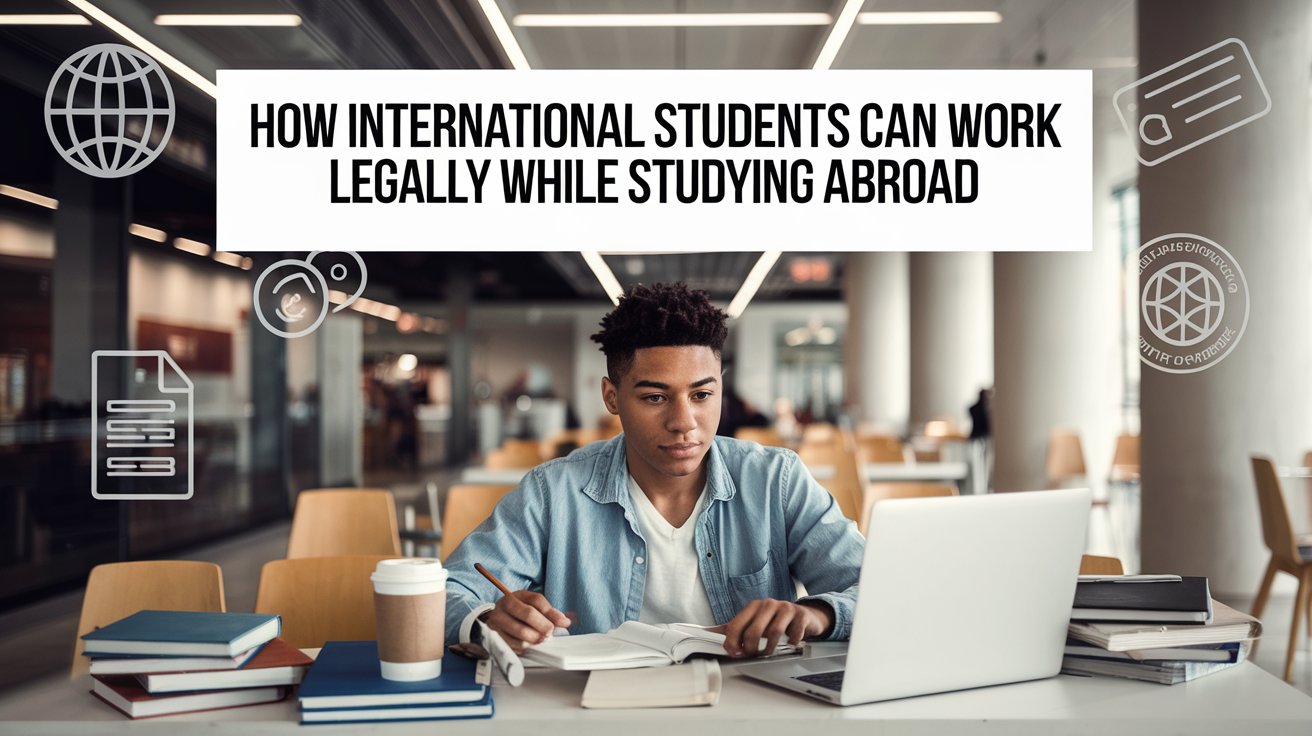Studying abroad is an exciting and transformative experience, but it can also come with significant financial demands. For many international students, working part-time is a practical solution to manage living expenses, gain valuable work experience, and integrate into the host country’s culture. However, navigating the legal requirements for working as an international student is crucial to avoid complications that could affect your visa or education.

This comprehensive guide explores how international students can work legally while studying abroad, including country-specific rules, job opportunities, and tips for balancing work and study.
Benefits of Working While Studying Abroad

Working while studying abroad offers several advantages beyond just financial support. Students who engage in part-time jobs often gain invaluable skills and experiences that contribute to their personal and professional growth.
One of the most immediate benefits is financial relief. Tuition fees, housing, transportation, and other living expenses can add up quickly. Earning a steady income can help ease the financial burden and make the study-abroad experience more manageable.
Another significant advantage is skill development. Working in a professional or customer-facing role allows students to enhance critical skills such as communication, teamwork, time management, and problem-solving. These are transferable skills that are highly valued in any career path.
Moreover, working provides an opportunity to network. Meeting colleagues, customers, and employers can help students build a professional network that might lead to future job opportunities. It also allows students to better understand workplace norms and culture in the host country.
Cultural integration is another key benefit. By interacting with locals in a work environment, students gain deeper insights into the social and cultural fabric of their host country, which enriches their overall experience abroad.
General Work Regulations for International Students

Before taking on any job, international students need to familiarize themselves with the general work regulations applicable in their host country. These rules are often tied to the type of visa the student holds and may vary significantly from one country to another.
The primary factor determining work eligibility is the visa type. Most student visas allow part-time employment, but the number of hours students can work is often limited to 20 hours per week during academic terms. During breaks or holidays, students may be permitted to work full-time.
It’s also essential to understand the types of jobs allowed under the visa conditions. For example, some countries restrict students to on-campus employment, while others may allow off-campus work in specific industries.
Another crucial consideration is taxation. International students are typically required to register for a tax identification number in their host country and comply with local tax laws. Failure to do so can lead to fines or other legal consequences.
Country-Specific Guidelines

United States
International students in the United States on an F-1 visa are primarily allowed to work on-campus for up to 20 hours per week during the academic year. On-campus jobs may include positions in libraries, cafeterias, or as research assistants.
Off-campus employment is generally restricted but can be pursued under specific programs such as Curricular Practical Training (CPT) or Optional Practical Training (OPT). These programs allow students to gain work experience related to their field of study, but prior approval from the Designated School Official (DSO) and the U.S. Citizenship and Immigration Services (USCIS) is required.
United Kingdom
In the UK, students on a Tier 4 (General) visa can work up to 20 hours per week during term time and full-time during breaks. On-campus jobs, such as working in a university library or as a student ambassador, are popular among international students.
The UK also offers post-study work opportunities through the Graduate Route visa, allowing students to stay and work full-time for up to two years after completing their degree.
Canada
Canada allows international students with a valid study permit to work off-campus for up to 20 hours per week during academic terms. Students can also work full-time during scheduled breaks, such as summer or winter holidays.
Canada’s Post-Graduation Work Permit (PGWP) program provides students the opportunity to work in Canada for up to three years after completing their studies, making it a highly attractive destination for international students.
Australia
Australia permits international students holding a Subclass 500 visa to work 48 hours per fortnight during the academic term. Many students find part-time jobs in hospitality, retail, or tutoring.
Australia also offers a Temporary Graduate Visa (Subclass 485) for students who wish to gain work experience in the country after graduation.
Germany
In Germany, international students can work up to 120 full days or 240 half days per year. These restrictions are flexible and often exclude on-campus jobs, such as research or teaching assistant positions.
Germany is particularly appealing for international students due to its low tuition fees and strong economy, offering ample opportunities for part-time and post-graduation employment.
How to Find Suitable Part-Time Jobs

International students have access to a variety of job opportunities that align with their skills, interests, and visa conditions.
On-campus jobs are among the most accessible options for international students. Universities often hire students as library assistants, research assistants, or administrative staff. These roles are convenient because they are typically close to classes and offer flexible hours.
Off-campus opportunities are also widely available in industries such as hospitality, retail, and customer service. Jobs like waitstaff, cashiers, or delivery drivers are popular due to their flexible hours and minimal skill requirements.
Freelancing is another viable option for students with specialized skills in areas such as graphic design, writing, or programming. However, students must ensure their visa permits self-employment or freelance work.
Tips for Balancing Work and Study

Balancing a part-time job with academic responsibilities can be challenging, but it’s achievable with proper planning and discipline.
One of the most important strategies is prioritizing academics. Students should remember that their primary goal is to succeed in their studies. Work schedules should be arranged around class times, assignments, and exams.
Time management is another crucial skill. Using digital tools like planners or scheduling apps can help students organize their work and study commitments effectively.
Communication with employers is essential. Being transparent about availability and academic obligations can help set realistic expectations and prevent conflicts.
Seeking flexible jobs that offer adjustable hours can also make it easier to balance work and study. Many employers who hire students are understanding of their academic priorities.
Common Challenges and How to Overcome Them

One common challenge faced by international students is time constraints. Balancing multiple responsibilities can be overwhelming, but setting realistic goals and prioritizing tasks can help manage workload effectively.
Language barriers can also pose difficulties, especially in customer-facing roles. Enrolling in language courses or practicing with native speakers can improve proficiency and confidence.
Cultural differences in the workplace may lead to misunderstandings or discomfort. Students should take the time to observe workplace norms and ask questions when needed to adapt better.
Finally, legal compliance is a critical issue. Students must regularly review their visa conditions and ensure they are not violating any regulations. Universities often have dedicated international student advisors who can provide guidance on employment-related matters.
Conclusion
Working while studying abroad is a fantastic way for international students to gain financial independence, professional experience, and cultural insight. However, it’s essential to understand and comply with the legal requirements of the host country to avoid jeopardizing your visa or education.
By exploring suitable job opportunities, balancing responsibilities effectively, and adhering to visa conditions, students can maximize the benefits of working part-time while pursuing their studies. This experience not only eases financial pressures but also prepares students for successful careers in a globalized world.





